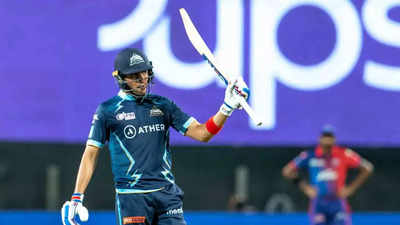Before Lucknow squanders a great platform and falls well short, Gujarat’s opener shares a significant opening stand with Saha.
At the back end of the league, Gujarat Titans are hitting a bewitching momentum that sets them on course to defend their title. The streak of ruthlessness shone brightly in their 56-run thrashing of Lucknow Super Giants — from the heavy-metal opening-wicket stand between Wriddhiman Saha and Shubman Gill that laid the foundation of a high-riser total to their clinical fielding and multi-dimensional bowling utility — as they virtually sealed a knockout spot.
There could be more destructive batsmen in T20 cricket than Shubman Gill; there could be more thrilling and consistent bats around too. But few make batting in this format as simple as Gill does, as though he is a mystic who strips T20 batting off its ridiculous power-hitting, yet is un-seduced by the scope of sophistry. Take any of his knocks across formats in isolation and blur out the shade of his jersey, most of the shot-making looks identical. The tempo of his batting could vary, but not the strokes. It’s a hallmark of great batsmen that they shift seamlessly into different garbs, but yet one could pick the difference without close dissection. Even Virat Kohli makes minor but noticeable adjustments from format to format — like he stands a bit deeper in the crease sometimes, or opens up his stance, and steps out to quicks frequently.
But what Gill does in Tests and ODIs, he does in T20s too, without fuss, without looking out of place, without making it look like hard labour. One stat captures the soul of his batting — just two runs were scored in the arc between point and the wicketkeeper, which is one of the most heavily-scored areas in a T20 innings. Staggeringly, as many as 81 runs came in front of the wicket.
He exudes a contagious calm, so much so that it sucks the explosive excitement out of T20s. Like when Saha was building a furious tempo, he was content nudging singles, tickling twos, unworried by perceptions, un-tempted by the frantic scoring rate of his batting partner, unselfishly exchanging the strike. When Gill struck his first six, off the eleventh ball he faced, the score was already 63, Saha inching to his half-century while Gill had barely broken into double digits.
That’s when Gill is at his most dangerous too, when he plays the support act, when he beds in and becomes difficult to dislodge, when he dons the triple role of anchor-accumulator-aggressor. His stability afforded Saha the freedom to attack relentlessly and reel out 81 off 43 balls in a partnership of 142 runs, yet Gill’s strike rate seldom dropped beneath 150, and at the end was 184.31. There was no boundary barrage — 44 of his 94 runs were hoarded with singles and twos, shrewdly manipulating the gaps on the largest ground in this IPL.
He exudes a contagious calm, so much so that it sucks the explosive excitement out of T20s. Like when Saha was building a furious tempo, he was content nudging singles, tickling twos, unworried by perceptions, un-tempted by the frantic scoring rate of his batting partner, unselfishly exchanging the strike. When Gill struck his first six, off the eleventh ball he faced, the score was already 63, Saha inching to his half-century while Gill had barely broken into double digits.
That’s when Gill is at his most dangerous too, when he plays the support act, when he beds in and becomes difficult to dislodge, when he dons the triple role of anchor-accumulator-aggressor. His stability afforded Saha the freedom to attack relentlessly and reel out 81 off 43 balls in a partnership of 142 runs, yet Gill’s strike rate seldom dropped beneath 150, and at the end was 184.31. There was no boundary barrage — 44 of his 94 runs were hoarded with singles and twos, shrewdly manipulating the gaps on the largest ground in this IPL.
None of the seven sixes or two fours he struck were manufactured. They were struck most naturally and through his staple boundary-scoring areas and shots. Like the swivel pull, glides through fine leg, full-pelt drives over extra cover, over-the-bowler’s-head thumps. The most memorable of them was his last six of the day, off Yash Thakur in the last over. The ball slung low to his bat, near yorker-length, but Gill managed to get underneath the ball and wrist it down the ground. Most batsmen would whip the ball through long-on, but he opened up his wrists slightly and swung Thakur down the ground without breaking a sweat.
He, thus, was the central figure of the perfect batting template in T20s, wherein one anchors the innings with a 180-odd strike rate with the others freewheeling around them.
What would haunt Super Giants is not that they came short of the gargantuan Titans total, but halfway through the game they were in with a realistic chance of hauling down the target. The start was fiery with Kyle Mayers racking up a torrent of muscled boundaries, enabling his team to post the first fifty runs in merely four overs. At 88 for 0 in 8.1 overs, Hardik Pandya and his crew of bowlers were genuinely dishevelled, short of both ideas and energy.
Just then, when a wave of anxiety was tossing them, Rashid Khan lifted them with a piece of pure athleticism. Mayers’ miscued pull off Mohit Sharma was quickly descending onto the ground, when Khan slipped in his lung-busting sprint from deep fine-leg to square leg. He did not pause and continued his run to complete the catch, diving to his right.
Then, Super Giants made tactical faux pas. Rather than one of their phalanx of big hitters – like Marcus Stoinis and Nicholas Pooran to pick from – they summoned Deepak Hooda, whose season has been all gloom. His partner Quinton de Kock too was tiring, and Titans seized the moment to suffocate the batsmen and gradually push them out of the victory trail. In the next 38 balls, all Super Giants could manage was 35 runs, with Hooda scoring a momentum-killing 11 off as many balls. All they mustered between the dismissals of Mayers and Hooda was a solitary six and no fours. The momentum was lost beyond retrieval.
From that juncture, it was nigh impossible to pull off a heist, the hopes of a victory sinking down the horizon. Soon departed Stoinis and de Kock, as a promising climax fell apart, and another one-sided encounter played out in the league. When Super Giants soul-search, they would realise the many mistakes they made. But more than that, they would cast envious glances on Gill. There aren’t many like him though.









